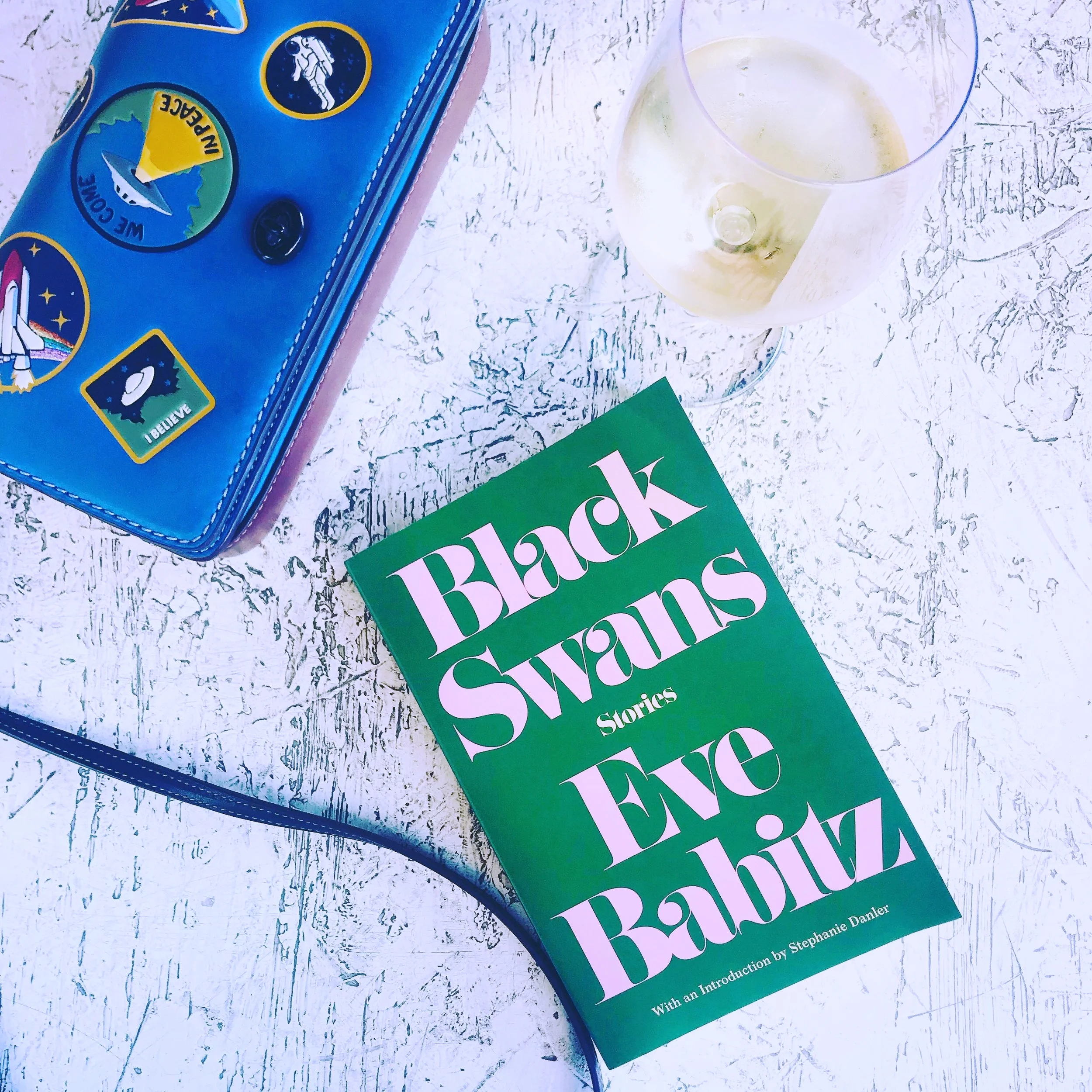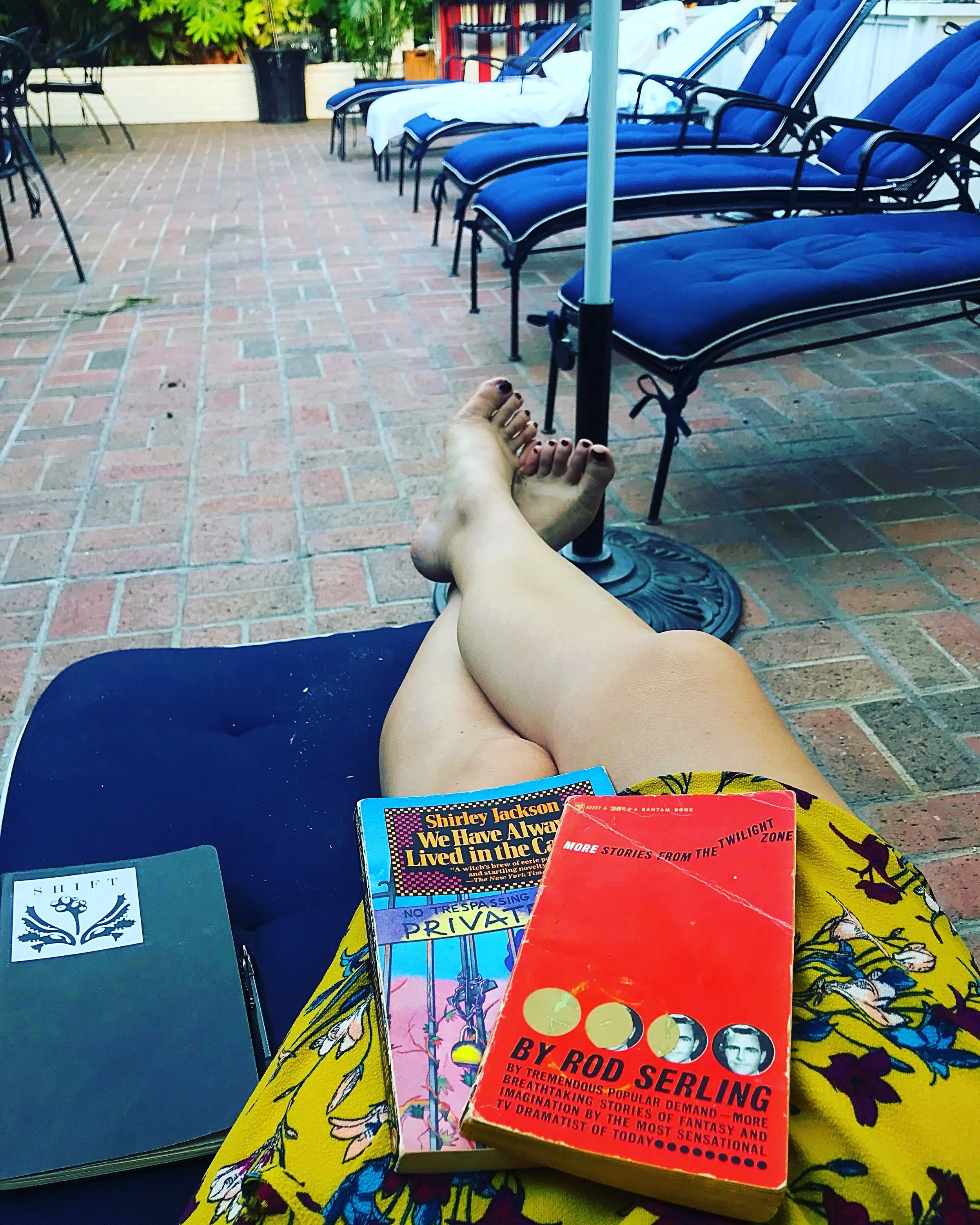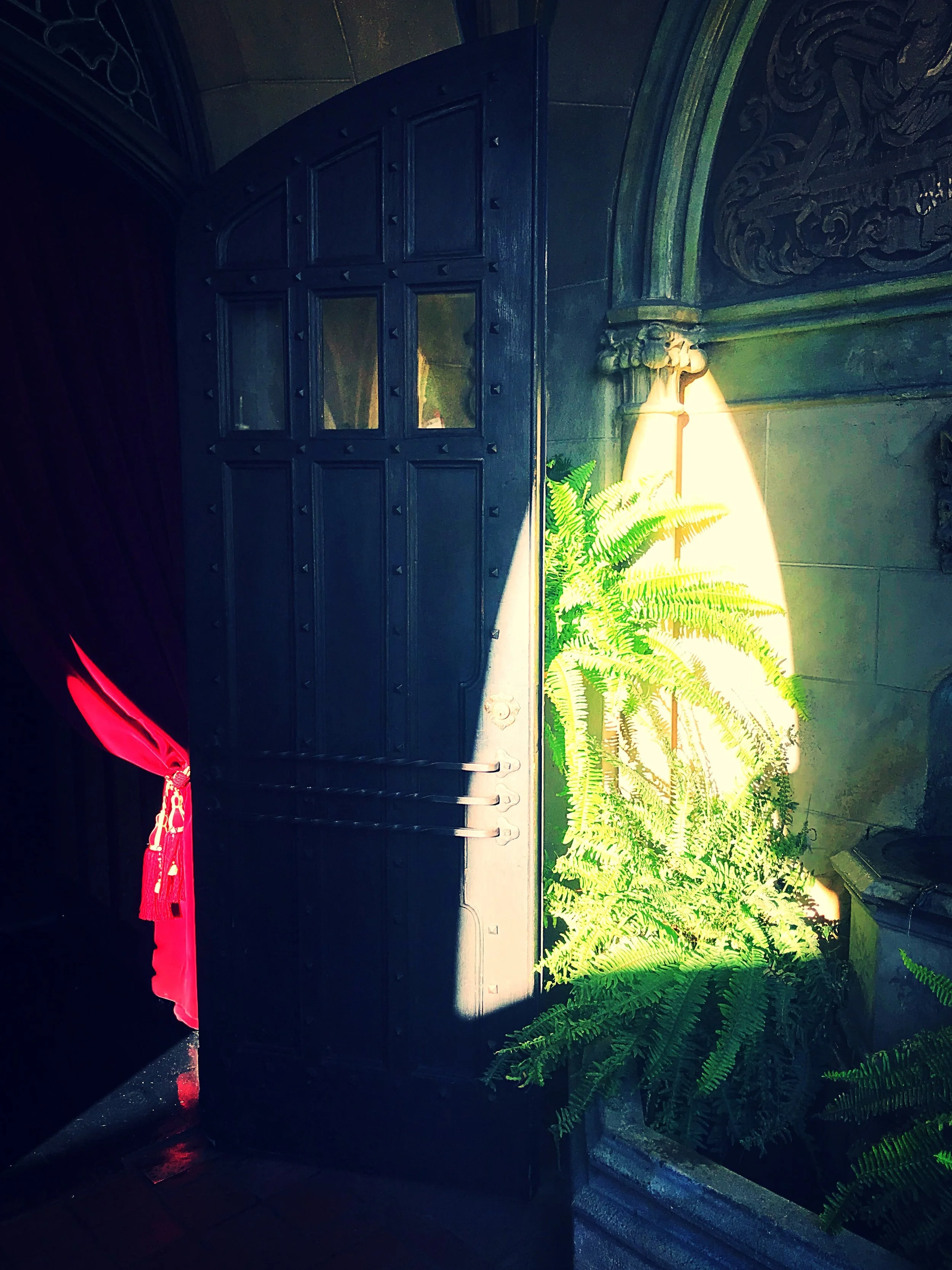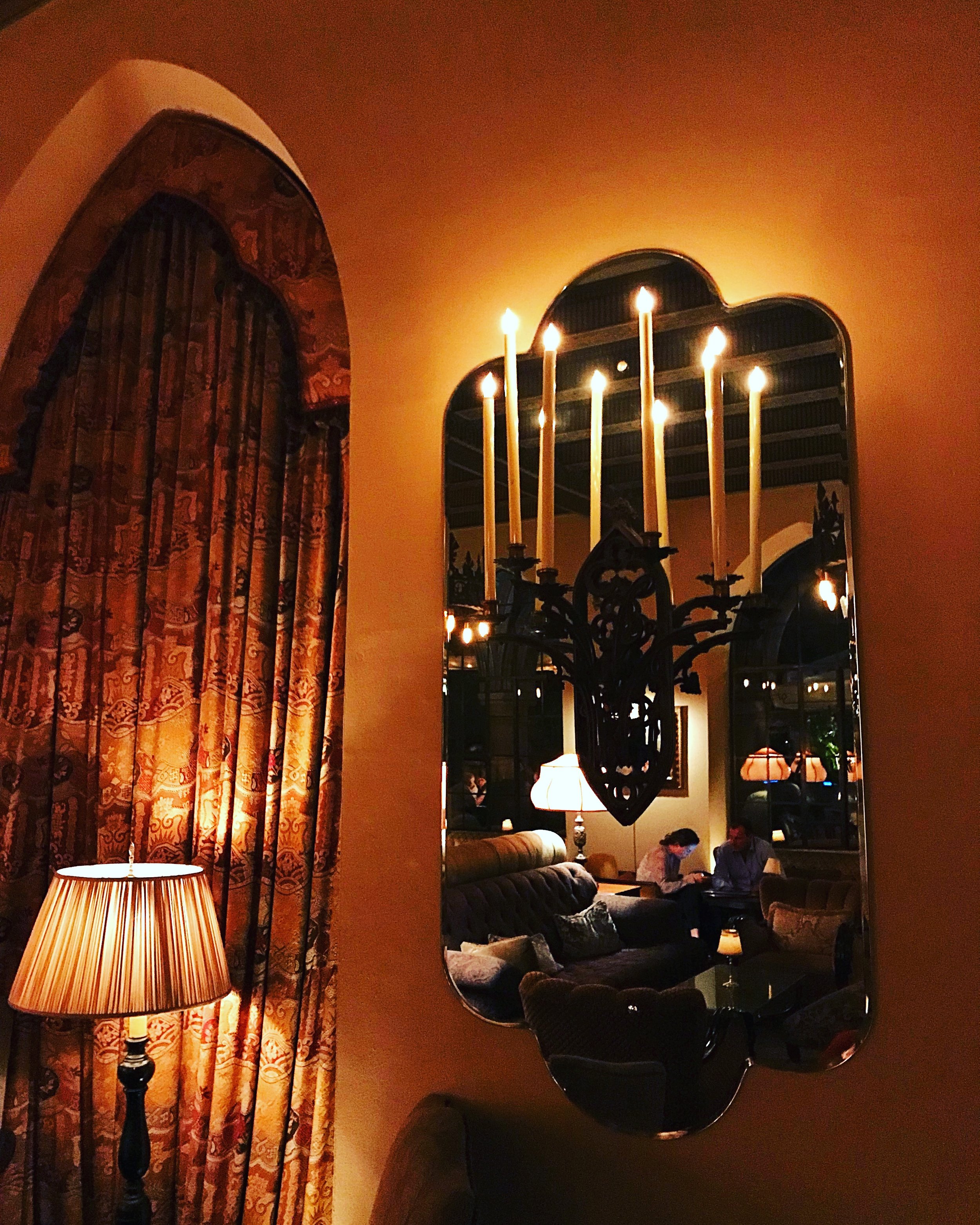BY TRISTA EDWARDS
I can’t remember the first time I heard about the Chateau Marmont. All I can recall is that I feel like have always, always, been glamoured by it. The history. The allure. The seediness. The luxury. The pain. The celebrity. The allusion to the Golden Age of Hollywood. And oh, the stories.
In Eve’s Babtiz’s story, “Expensive Regrets,” in the newly reissued collection of stories Black Swans, she writes of a man she had been flirting with by mail for years, Renzo, who was finally coming to L.A. to rendezvous with her and insists on staying at the Chateau because of story she had written long ago. “If I can’t stay at the old Garden of Allah, I can at least mingle with its ghosts,” Renzo wrote to Babtiz.
There are a lot of ghosts at the Chateau.
Many folks are aware, to some degree, of the hotel’s history. Some of the stories are quite infamous.
RELATED: Dearly Departed: Our Writer's Diary of a Hollywood Death Tour
John Belushi died of a drug overdose in Bungalow #3. Led Zepplin’s John Bonham rode his motorcycle through the lobby. Howard Hughes spied on women lounging poolside from his balcony. F. Scott Fitzgerald had a heart attack in front of the hotel. James Dean allegedly jumped through a window to impress Nicholas Ray, director of Rebel Without a Cause. Jean Harlow and Clark Gable carried on an illicit affair there during her honeymoon with cinematographer Harold Rossom. Renown photographer Helmut Newton crashed his Cadillac into a wall on Sunset Blvd. as he sped out of the hotel driveway. And, perhaps the first story I ever heard about the Château, Jim Morrison may or may not have fallen off the roof.
And there continues to be salacious accounts of Hollywood stars engaging in all kinds of sex, drugs, and rock-n-roll within the walls of this nearly ninety-year-old hotel year after year.
***
I’ll admit it—I had never heard of Eve Babitz. Until this past spring, that is. Until the Berkley, California based Counterpoint Press reissued her 1993 collection of short stories, Black Swans, and it persistently popped up in all of my social media feeds. The emerald green cover with its wide, soft pink letters stretching the title and Babitz’s name across the book was ubiquitously present every time I logged on.
Enjoying Babtiz & some summer evening wine.
Often, instead of the cover, a black and white photo of Babitz herself would appear with the following blurb:
Black Swans is a collection of nine stories that look back on the 1980s—a decade of dreams, drink, and stoned youth turning Republican. Babitz prowls California telling tales of a changing world. She writes about the Rodeo Gardens, about AIDS, about learning to tango, about the cemetery of Hollywood, the self-enchanted city, and, most importantly, about the envy and jealousy underneath it all.
Babitz’s inimitable voice propels these stories forward, corralling everything that gets in their way: sex, rage, the Chateau Marmont, youth, beauty, Jim Morrison, men, women, and black swans.
Two words gripped me more than any other—Chateau Marmont.
I bought the collection immediately.
***
Many have claimed that from its very inception the Chateau has been a tantalizing lodestone for Hollywood’s elite, poets, artists, creatives, and dreamers of all kinds.
I am no exception. Long before I actually spent the night there, I pined for the charm the Franco Gothic-inspired villa, the “Castle on the Hill,” as the Chateau is often called. There’s something about the hotel that I can’t quite put my finger on that I find seductive about this enigmatic oasis in the middle of La-La Land.
Lana serenading poolside. Because nothing is more quintessential Chateau Marmont than that.
Geographically, it sets somewhat hidden above Sunset Blvd…which, as many know, is not a glamorous place at all. When you enter, you feel as if you literally disappear right in the middle of Hollywood. You just escape into another world. It wields an inconspicuous nature in both location and in its notions of hospitality, particularly towards its famous guests. (The management and staff pride themselves on being discreet and most of the storied history and rumors do not leave the grounds via the hotel’s lips, so to speak.) It feels like a temporary womb in which you fall into the comfort of whimsy and luxury and all else falls away. Time just feels like it stops and all that matters is that you are doing nothing.
This is problematic, of course. This elite hedonism. This luxurious ennui. This privilege of doing nothing.
***
In the introduction to Babtiz’s collection, Stephanie Danler is rightfully critical and calls attention to the author’s obliviousness to the 1992 L.A. riots, the city literally burning to the ground, as she and Renzo lock themselves in a room of the Chateau and engage in a frenzied tryst that carries on for days. During their lovemaking, Babtiz continually makes note of the “smokiness’ “or “fiery-ness” in the air:
The air was velvet, but then it what wasn’t, except for his teeth, which were sharp. With his white skin and shiny wet black hair, things just marbleized into unbridled fiery endlessness, almost as if we lay in smoke.
Sometimes we’d talk for what seemed like days and then we’d start kissing, and things would lapse into that parallel universe you can only find in a place where they leave you along and you’re not home. Every now and then we’d shove fistfuls of cherries or mangos into each other’s months before passing out and then wake up still in dreams, with that velvet smoke throughout everything.
The air smells like its burning,’ he said once, looking out the window to make sure, but the hills behind us, in some strange light, were still and quiet.
RELATED: Tits and Demons: Five Possession Films That Are Actually About Female Sexuality
Albeit, a work of fiction, the female protagonist is a barely veiled version of Babtiz herself. You often forget that these stories are fiction as you feel like you are reading essays as they are written from the first person and the female protagonist is never named. It is very easy, after learning Babtiz’s personal history, to not slip into feeling like you are reading straight from the pages of her diary and when the couple realizes that there are no wildfires, a common environmental threat in Southern California, they go back to their carnal indulgences.
It is often said that there is something refreshing about Babtiz and her writing. Take the few opening lines from this piece in The New Yorker, for example:
Few things are as conspicuously absent in contemporary fiction as pleasure for pleasure’s sake. Gratification, when it comes, is surrounded by guilt and bitterness; consumption is anxious; sex mostly seems like a vehicle for some highly determined thematic point.
This sentiment is not only apparent in her writing but her rather charmed life that all too often goes hand in hand with disregard. Babtiz is the only child of an artist and a musician. Her father, Sol, was a classical violinist on contract with 20th Century Fox and friends with famed composer Igor Stravinsky, who is also her godfather. From a young age, Babtiz's life was a revolving door artists and musicians and actors, a community that notoriously thrives on fame and, thus, accustomed to a certain element of indulgence without consequence.
Babtiz had her first brush with personal fame when, at twenty, she posed for nude while playing a game of chess with Marcel Duchamp, who was 76 at the time.
She dated the "bad boy" musicians, writers, and actors of her day, notably Jim Morrison and Harrison Ford, and tore through L.A. in a wave of cocaine, booze, and LSD-fueled nights with seemingly little consequence for any destruction or danger she may have caused or aided in.
Even her character in the short story "Coco" expresses little remorse or sadness when her friend Coco dies (presumably from an alluded to drunk driving accident). When Coco's ex-husband calls to break the news of her crashing into a telephone pole, the main character responds, almost nonchalantly, with "Oh." The main character does express some regret in feeling she could have done something to permit Coco's destructive behavior (re: drugs and drinking and harmful men) to prevent this tragic moment but it feels as if this regret is short-lived and maybe even Coco's death shrugged off as just an unfortunate, yet understood, condition of living the life of an Angeleno.
And this sentiment of disregard goes hand in hand with the Chateau Marmont and luxury, in general. Make a mess? Somebody will clean it up. Need a glass of wine? Somebody will bring it to you. Need to hide from the reality of your life and the world at large? This is the place. It is a privilege to retreat.
***
I will be the first to admit that I am prone to self-enchantment. I was thoroughly enchanted by my time at the Château. Aware of my fascination, my husband surprised me by booking a room for one night in celebration of our one-year anniversary. One night is, indeed, still a mighty financial extravagance, celebration or not.
What you are paying for is the history, the exclusivity, the perceived glamour. You are essentially paying for the story and story ain’t cheap. The rooms themselves are old—timeworn with peeling paint, chipped fixtures, creaky wooden floorboards. If you come expecting shining opulence in state of the art accommodations, then this may not be the hotel for you. To me though, the worn qualities of the hotel weave into its history.
Poem inspired by my night at the Chateau. Published in FlapperHouse.
Luxury comes in so many other unexpected forms, though.
When you enter the room, there is a bowl of perfectly arranged chilled plums awaiting you. I was struck by this detail as slightly erotic and an unanticipated extravagance. It quickly became something I never knew I needed.
The mini bar is not so mini. The typical array of spirits goes beyond the small airplane bottles you would expect but goes beyond that to include a variety of traditionally sized bottles of wine, whiskeys, and vodka as well—Maker’s Mark, Jim Beam, Absolut. It is like they knew you came to drink.
And then there is the candle. The Chateau Marmont Alessandra Candle.
“The Alessandra candle is a private blend of florals and spices, gardenia and vanilla that reminds us of one of favorite hotels. Honey-amber colored soy wax fills a frosted glass etched with Chateau Marmont's original logo.” -Clare V
Rumor has it that when Lindsey Lohan was kicked out of the Chateau for an over $46K unpaid bill, a large portion of the sum included numerous Allessandra candles, which cash in at a hearty $50 a pop if you care to take one home.
RELATED: Fire Spell for the Dying Days of Summer
I may be somewhat biased being candle shop owner and maker myself, but this particular touch and mark of lavishness resonated with me right down to my core.
The hotel was presenting luxury through the sense of scent. Nothing, to me, seems more decadent or presents the possibility of carrying you to a different world than the power of fragrance, smoke, and flame.
***
Danler calls attention to this particular moment of indulgence in "Expensive Regrets," exhibiting awe at what she deems “Classic Eve”— “heedless, living for the holy, corporeal present tense.”
Of course, Danler stresses, the smoke the characters note is not a poetic, aesthetic element whipped up for a literary scene of melodramatic lovemaking but the smoke of the riots, not a danger far off in the hills but right there in the city, where over sixty people died, and thousands injured.
The riots, alluded to in the book, were inspired by the acquittal of LAPD officers for the arrest and beating of Rodney King. The beating of King, a black man, was filmed by a civilian from the nearby balcony and the footage was distributed by news media worldwide. The riots began the day the verdict of acquittal—in which three of the officers where white—was announced and lasted six days.
In the era before smartphones, captured footage of police brutality against a black citizen was considered novel in both in the media and in the courtroom. This particular instance is considered by many to be the first in the wave of digital “citizen journalism” that grew in response to advanced technologies. Since the 90s, the growth of handheld, personal digital devices—technology that we may take for granted now—have allowed for the direct and immediate documentation of the rampant persistence of police brutality against POC that has been vital in fighting the institutional racism in law enforcement.
RELATED: Mike Brown, Tamir Rice, And Contorting the Narrative
It is difficult to read this scene. As Danler notes, “there are half a dozen moments in Black Swans that feel disturbing in hindsight [as] Eve’s lack of political consciousness is hard to read in 2018.” But, as Danler continues, these moments also feel so human:
The reason this thoroughly entertaining episode recounted in “Expensive Regrets” is successful is not through a righteous epiphany on the part of the characters. Every Eve reader knows they've come to the wrong place if they want judgment on the recklessly self-absorbed antics of the city's denizens
Although, here I am critiquing and asking myself why exactly is it considered successful for a person to not have a righteous epiphany or even awareness? To be, as Babtiz writes, “self-enchant
Reading self-absorbed and beautiful literature that ignores reality is, to me, both rewarding and disappointing. I can't help but think of AnaÏs Nin as I read Babtiz and I how long for and gasp at her hypnotic sentences of hedonism while also finding myself disappointed in her lack of compassion when it comes to willingly deceiving those around her for the sake of art and pleasure. I am both envious and contemptuous...thinking doesn't beauty ultimately erode or disappoint us, anyway?
***
After an evening of drinks at the bar, my husband and I retired to our room. We opened the door to the warm glow and sensual aroma of a burning candle as part of the hotel’s turndown service.
I was completely enchanted the whole night with everything The architecture. The décor. The flaws. Even the peeling paint and dusty furniture was beautiful. I kept finding little corners and pockets of light to capture with my camera.
I felt as if I was under a spell. Everything felt surreal. It was a pure dreamland. I felt like I was someplace I shouldn’t be and that my presence at the hotel was somehow a mistake—that I snuck in past the invisible celestial gatekeepers to traipse on cloud nine among the literal and figurative stars. I couldn't help think that I didn't deserve this moment. This stay. This little vacation. Money often shames me like that. Extravagance is not a normal part of my daily life or upbringing so it makes experiencing these moments of reward almost carry a tinge of ignominy.
Perhaps that's one of the reasons I don’t want to be like Babtiz—swallowed up in the warm blanket of obliviousness.
Still, it's easy to see how this kind of enchantment works, especially when you go into it willingly and starry-eyed, knowing it's impermanence, drinking up every delicious second.
It can be easy to indulge in Dionysian splendor and give into the senses and carnal desires that accompany luxury hotels. I can’t pretend I don’t like it.
Maybe that’s what made me so uncomfortable after reading Black Swans, that I did see some of myself, to a degree, in Babtiz and her characters. I felt a deep, and selfish, reprieve in Danler’s observation that Babtiz is just another flawed human and even somewhat enviable in her ability to live only in the corporeal moment of her desires.
I am flawed. I am enchanted. If given the opportunity, I will fall at the feet of glamour. It lures me in a like a moth to the flame.
YET despite the dizzying grandeur and my temporary love for luxury....it is important to ensure one foot is grounded. This particular kind of privilege, whether sustained or for a day, doesn't mean you get to shut off your humanity. It is okay to be enchanted as long as you remember that it's not real, that there's a real world out there. This, this, should never be forgotten.
Trista Edwards is an associate editor at Luna Luna Magazine. She is also the curator and editor of the anthology, Till The Tide: An Anthology of Mermaid Poetry (Sundress Publications, 2015). You can read her poems at 32 Poems, Quail Bell Magazine, Moonchild Magazine, The Adroit Journal, The Boiler, Queen Mob's Tea House, Bad Pony, Occulum, and more. She creates magickal candles at her company, Marvel + Moon.




















































